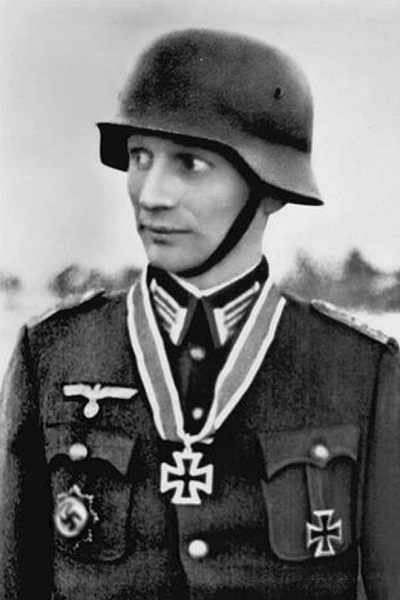Wittgenstein, Freiherr von , Leo-Volkhard
- Date of birth:
- July 13th, 1913 (Posen an der Warthe/Posen, Germany)
- Date of death:
- February 22nd, 1945 (Bonn/Rhineprovince, Germany)
- Nationality:
- German
Biography
Leo-Volkard von Wittgenstein was killed in an accident on February 22nd, 1945. At that moment he served as Major im Generalstab.
Do you have more information about this person? Inform us!
- Period:
- Second World War (1939-1945)
- Rank:
- Oberleutnant (1st Lieutenant)
- Unit:
- Infanterie-Regiment 410
- Awarded on:
- November 16th, 1941
- Period:
- Second World War (1939-1945)
- Rank:
- Hauptmann (Captain)
- Unit:
- Kommandeur III. / Grenadier-Regiment 410
- Awarded on:
- April 6th, 1943
“Resolve in the Moment of Greatest Danger - How Hauptmann von Wittgenstein sealed off a penetration with his Pomeranians:
Beforehand we previously reported that Hauptmann Leo Volkhard Frhr. von Wittgenstein was awarded the Knight’s Cross as the commander of a Pomeranian Infanterie-Bataillon. One of his Unteroffiziere has now provided us with the following account of how his commander was able to frustrate a Soviet Division through a bold decision.
‘On the 23.02.1943 the Soviets entered into the village of J. with tanks and strong infantry forces, and went on to break through beyond the road. It was not long before the bulk of the 200th Soviet rifle division was streaming through the gap. A Grenadier-Regiment was thus deployed to cut off the enemy. The Pomeranian Bataillon led by Hauptmann Wittgenstein had the mission of following up on the flank of the first attacking Bataillon in order to seal off the point of penetration.
The ranks of the first Bataillon were decimated by murderous fire of all calibers from the fortress-like village of J. Most NCOs become casualties, and those that remained tried in vain to continue the attack. The attacking forces became insufficient for the task that was allotted to them. All the battlefield advantages lay on the side of the enemy.
Then, at the moment of greatest danger, Hauptmann von Wittgenstein made an independent decision to capture J. himself. Leading at the head of his Bataillon, he stormed across the open fields and through heavy infantry/tank fire with cries of ‘Hurra’. The men of his Bataillon were inspired by his exemplary bravery, and they managed to take J. by storm without worrying about the security of their flanks. The Soviets recognized the impending danger and fired upon the Bataillon with all the weapons at their disposal. The shells hammered ceaselessly upon the German positions. However, thanks to the personal intervention of Hauptmann von Wittgenstein at the hotspots of the combat, it was possible to reorder the Bataillon for defense. The enemy was thus badly bloodied during every one of their immediate counterthrusts that sought to relieve the pressure on their flank.
The enemy was defeated, totally! The bold deed of Hauptmann von Wittgenstein forced the enemy to change the direction of their main thrust, and it bought valuable time for the entire unit to build up a defensive front that would seal off the entire enemy penetration.’
- Unteroffizier Arntz”
- Period:
- Second World War (1939-1945)
- Period:
- Second World War (1939-1945)
- Period:
- Second World War (1939-1945)
- Period:
- Second World War (1939-1945)
- Period:
- Second World War (1939-1945)
- Period:
- Second World War (1939-1945)
Sources
- Photo 1: Igor Poul
- - FELLGIEBEL, W.P., Elite of theThird Reich, Helion & Company Limited, Solihull, 2003.
- PATZWALL, K. & SCHERZER, V., Das Deutsche Kreuz 1941-1945, Band II, Verlag Klaus D. Patzwall, Norderstedt, 2001.
- Die Grenz-Zeitung (Edition 105)










